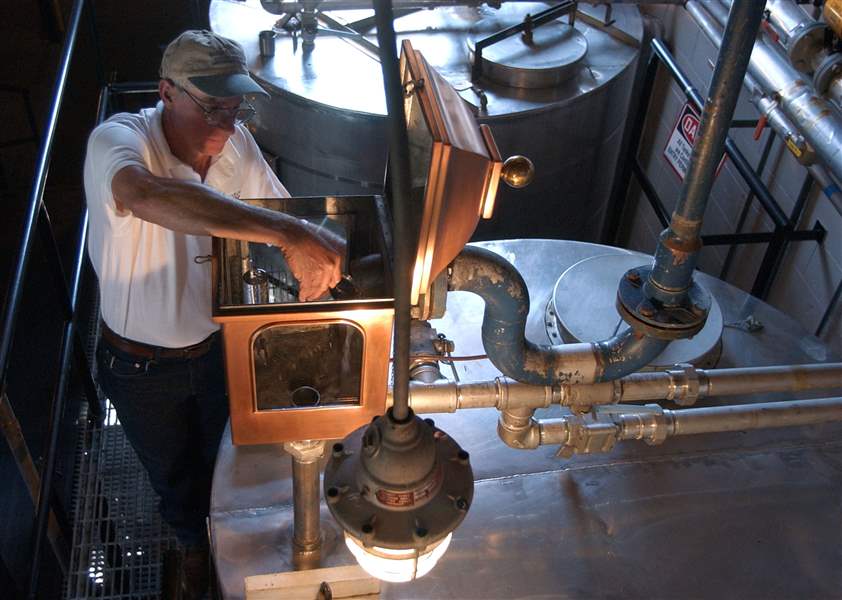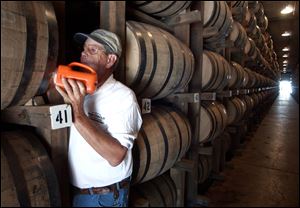
Tenn. drops investigation into liquor giant Diageo
6/11/2014
FILE -- In this Sept. 2003 file photo, Gary Hinshaw tests the proof of the whiskey at the George Dickel Distillery near Tullahoma, Tenn. Alcohol regulators ended their investigation Tuesday, June 10, 2014, into whether George Dickel, a subsidiary of liquor giant Diageo, violated state laws by storing whiskey in neighboring Kentucky. (AP Photo/Mark Humphrey, File)
ASSOCIATED PRESS

Dewayne Evans checks for leaks in the barrels of whiskey aging in a warehouse at the George Dickel Distillery near Tullahoma, Tenn. George Dickel is a subsidiary of liquor giant Diageo.
NASHVILLE, Tenn. — Alcohol regulators on Tuesday abruptly ended an investigation into whether global liquor giant Diageo PLC violated state laws by storing whiskey made in Tennessee in neighboring Kentucky.
The decision came after master distiller John Lunn testified that the liquor stored in Kentucky would be blended with other Diageo spirits, and that George Dickel Tennessee Whisky has been made and stored at the distillery all along.
Diageo and the state had been fighting in federal court over a law that requires whiskey made in Tennessee to be stored in or around the county where it is distilled. Diageo said the law violated interstate commerce rights under the U.S. Constitution.
About 16,000 barrels of bourbon and wheat whiskey produced at the Diageo subsidiary about 60 miles south of Nashville had been shipped to Kentucky over the past five years because of a warehouse shortage, Lunn said.
Assistant Attorney General Kyle Hixson said in federal court after Lunn’s testimony that the state would not pursue penalties against Diageo, though he declined to say why.
Diageo attorney Bobby Burchfield said he will seek an agreement with the state to not seek penalties against Dickel if it has to send whiskey out of state again.
“We had always hoped for an amicable resolution of this question,” Guy Smith, executive vice president for Diageo North America, said in a statement.
Lunn said that by 2009, the Dickel warehouse was nearly to capacity. Company officials could not find a suitable storage facility in Tennessee, so they decided to move the whiskey to storage facilities owned and leased by Diageo in Louisville, Kentucky.
Had that step not been taken, Lunn said, “most likely we would have had to close the distillery until we could get another warehouse built.” Dickel has since built another $7 million warehouse that opened in April and plans to build another $5 million structure in the next few years.
Hixson, the state attorney, argued at the beginning of the hearing that the state’s storage law is in place so inspectors can keep track of whiskey made in Tennessee. Without those rules, “the danger is that bottled liquor can move to the black market.”
Burchfield took issue with that statement, saying “Diageo is a reputable business — it does not have a reputation for selling to the black market.”
After hearing from company witnesses, the court broke for lunch before planning to hear from Alcoholic Beverage Commission Director Keith Bell, the named defendant in the Diageo lawsuit. But before Bell could take the stand, Hixson announced that the state had decided after Lunn’s testimony that Dickel had not violated the storage statute.
“So that’s it,” said U.S. District Judge Nixon, adjourning the hearing.